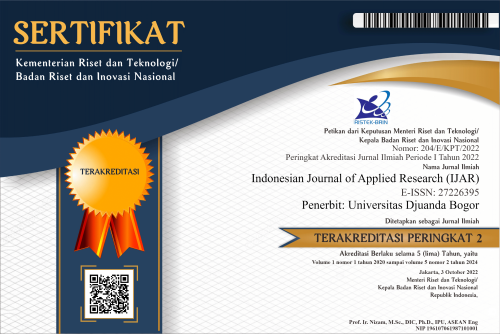Heart Rate Detection of Stress Levels for Pregnant Women
Abstract
During pregnancy, there are changes because the fetus begins to grow and develop in the pregnant woman's stomach. Physiology greatly influences its development, especially in hormonal and metabolic changes that affect the psychological stress level of pregnant women. This study aims to determine the initial action to detect heart rate by looking at stress levels in pregnant women. The results of stress measurements are not normal when the heart rate is less than 60 bpm and more than 100 bpm, while in conditions of more than 60 bpm and less than 100 bpm, the results obtained are normal conditions. This study uses a hardware programming approach with the stages: Project Planning, Research, Component Testing, Mechanical System Design, Functional Test, Functional Test, Overall System Functional Test, System Optimization. The results show that this tool has worked well in monitoring heart rate when stressed in real-time using a pulse sensor displayed via telegram notifications in the form of total data. Still, because it is only in the form of notifications, there is no storage in the form of a database.
References
Arthana, I. K. R., Pradnyana, I. M. A., & Kurniati, D. P. Y. (2018). Sistem Monitoring Detak Jantung dan Lokasi Pasien. Jurnal Pendidikan Teknologi Dan Kejuruan, 15(1).
Astuti, A. B., Santosa, S. W., & Utami, M. S. (2000). Hubungan antara dukungan keluarga dengan penyesuaian diri perempuan pada kehamilan pertama. Jurnal Psikologi, 27(2), 84–95.
Biaggi, A., Conroy, S., Pawlby, S., & Pariante, C. M. (2016). Identifying the women at risk of antenatal anxiety and depression: A systematic review. Journal of Affective Disorders, 191, 62–77.
Bidjuni, H., & Kallo, V. (2014). Hubungan karakteristik ibu hamil trimester III dengan tingkat kecemasan dalam menghadapi persalinan di Poli KIA Puskesmas Tuminting. Jurnal Keperawatan, 2(2).
Campbell, R. K., Tamayo-Ortiz, M., Cantoral, A., Schnaas, L., Osorio-Valencia, E., Wright, R. J., Téllez-Rojo, M. M., & Wright, R. O. (2020). Maternal prenatal psychosocial stress and prepregnancy BMI associations with fetal iron status. Current Developments in Nutrition, 4(2), nzaa018.
Coussons-Read, M. E. (2013). Effects of prenatal stress on pregnancy and human development: Mechanisms and pathways. Obstetric Medicine, 6(2), 52–57.
Elsanti, D., Yulistika, D., & Yuliarti, Y. (2016). Hubungan Antara Tingkat Stress Dan Aktivitas Fisik Terhadap Kejadian Pre Eklamsi Pada Ibu Hamil Di Wilayah Puskesmas Kalibagor. Prosiding SNaPP: Kesehatan (Kedokteran, Kebidanan, Keperawatan, Farmasi, Psikologi), 2(1), 177–186.
Faesal, A. M., Santoso, I., & Sofwan, A. (n.d.). DESAIN STETOSKOP UNTUK DETEKSI DETAK JANTUNG MENGGUNAKAN SENSOR SUARA DAN PENGHITUNGAN BPM (BEAT PER MINUTE) MENGGUNAKAN ARDUINO. Transmisi: Jurnal Ilmiah Teknik Elektro, 22(2), 44–50.
Fatmawati, K., Sabna, E., & Irawan, Y. (2020). Rancang Bangun Tempat Sampah Pintar Menggunakan Sensor Jarak Berbasis Mikrokontroler Arduino. RJOCS (Riau Journal of Computer Science), 6(2), 124–134.
Manuaba, I. B. G., Manuaba, I. C., & Manuaba, I. (2007). Pengantar kuliah obstetri. Jakarta: Egc, 450–455.
Mardiansah, M., & Wildian, W. (2019). Rancang Bangun Alat Monitoring Detak Jantung Pasien Rumah Sakit dengan Sistem Telemetri Berbasis Ardiuno UNO R3. Jurnal Fisika Unand, 8(4), 355–361.
Nahar, M. (2019). Hubungan Spiritual Support dengan Kecemasan dan Adaptasi Spiritual Ibu Hamil.
Rahmawati, W. R. (2019). Pengaruh Stres pada Ibu Hamil Trimester III terhadap Aktivitas Janin yang Dikandung di Wilayah Puskesmas Grabag 1 Kabupaten Magelang. JURNAL KEPERAWATAN MERSI, 8(2), 37–42.
Rahmi, L. (2010). Hubungan usia, tingkat pendidikan, dukungan suami, dan dukungan keluarga dengan tingkat kecemasan menjelang persalinan pada ibu primigravida trimester III di poliklinik kebidanan RSUP dr. M. Djamil padang tahun 2009. Penelitian, Fakultas Keperawatan.
Schetter, C. D., & Tanner, L. (2012). Anxiety, depression and stress in pregnancy: Implications for mothers, children, research, and practice. Current Opinion in Psychiatry, 25(2), 141.
Sehmawati, S., & Permatasari, A. S. (2020). Self-Hypnosis Terhadap Tingkat Kecemasan Ibu Hamil Dalam Persiapan Menghadapi Persalinan Di Masa Pandemic Covid-19. 1(1), 58–65.
Septianingrum, Y. (2015). Efektivitas relaksasi selama kehamilan terhadap penurunan stres, kecemasan ibu hamil dan respon janin dalam kandungan. Journal of Health Sciences, 8(2).
Wahyuni, Y., & Maulana, I. (2021). Smart Identification of Heart Rate in Pregnant Women. 1(1), 15–15.
Widiani, N. N. A., & Noviani, N. W. (2020). Pengaruh senam hamil terhadap tingkat stres ibu hamil trimester III di Kecamatan Sukawati tahun 2020. DINAMIKA KESEHATAN: JURNAL KEBIDANAN DAN KEPERAWATAN, 11(2), 446–451.
Copyright (c) 2022 Indonesian Journal of Applied Research (IJAR)

This work is licensed under a Creative Commons Attribution-ShareAlike 4.0 International License.
The Authors submitting a manuscript do so on the understanding that if accepted for publication, copyright publishing of the article shall be assigned/transferred to Indonesian Journal of Applied Research (IJAR) Universitas Djuanda as Publisher of the journal. Upon acceptance of an article, authors will be asked to complete a 'Copyright Transfer Agreement'. An e-mail will be sent to the corresponding author confirming receipt of the manuscript together with a 'Copyright Transfer Agreement' form by online version of this agreement.
Indonesian Journal of Applied Research (IJAR) Universitas Djuanda, the Editors and the Editorial Board make every effort to ensure that no wrong or misleading data, opinions or statements be published in the journal. In any way, the contents of the articles and advertisements published in the Indonesian Journal of Applied Research (IJAR) Universitas Djuanda are sole and exclusive responsibility of their respective authors and advertisers.
Remember, even though we ask for a transfer of copyright, our journal authors retain (or are granted back) significant scholarly rights as mention before.
The Copyright Transfer Agreement (CTA) Form can be downloaded here: Copyright Transfer Agreement-IJAR 2020
The copyright form should be signed electronically and send to the Editorial Office e-mail below:
Prof. Dr. Ir. Dede Kardaya, M.Si. (Editor-in-Chief)
Universitas Djuanda
Jl. Tol Jagorawi No.1, Ciawi, Kec. Ciawi, Bogor, Jawa Barat 16720
Website: http://journal.unida.ac.id/index.php/IJAR/index
Email: ijar@unida.ac.id






 This work is licensed under a
This work is licensed under a 